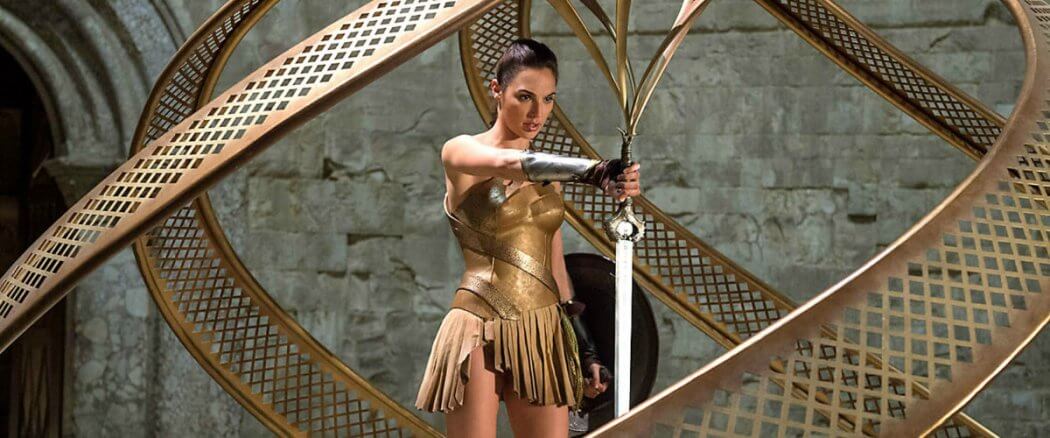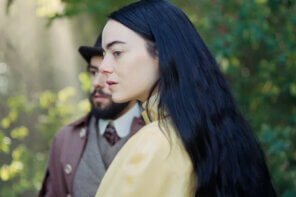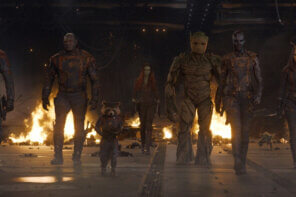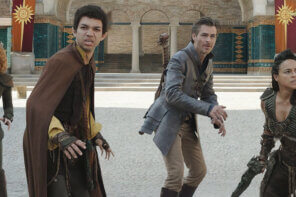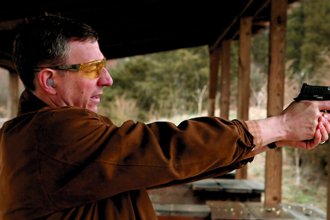I should start this piece by admitting something: I’m firmly entrenched as a Marvel Cinematic Universe fan. I loved watching the Spiderman and X-Men movies as a young teenager, and I’ve enjoyed seeing the rise of Marvel as a movie powerhouse. There aren’t too many smart and fun blockbusters out there, and the MCU has provided more than its fair share. I’ve never stepped into the DC movie universe. I never saw Man of Steel, Batman v. Superman, or Suicide Squad. For the most part, I’ve bought into the critical groupthink and chosen not to partake in what appeared to be lackluster movies.
However, I’m sure I wasn’t the only one with that mindset, who was dying to see the newest addition to the DC universe: Wonder Woman. I don’t know much about the mythos behind the character, but the prospect of seeing a major female superhero dominating the screen was appealing to me. I consider myself a feminist, and agree that it’s far past time audiences were graced with the Amazonian princess’s presence on the silver screen. I’d be lying if I said I had thrown all caution to the wind; the stink of the last few DC movies still hangs in the air for me. But setting aside my hesitance was easy as the release date grew closer and the hype grew.
Important note: As you may have gathered by my picture on the site, I’m a young, white man. I want to emphasize this because it’s impossible to talk about Wonder Woman without addressing the feminist themes inherent throughout the story. I want to say, as a man, I feel totally unqualified to talk about this subject. I have a wonderful group of women in my life who identify as feminists, and I feel lucky to have talked with them about good, practical feminism for men. If I misrepresent feminism or say anything remotely offensive in this review, I apologize. I’m still learning, and by God’s grace, I’ll get better every day in the way I treat and talk about women in the movie industry.
Gal Power
I honestly don’t remember much about the announcement of Gal Gadot as Wonder Woman a few years ago. I seem to remember there was some controversy concerning her status as a person of color. Personally, I didn’t read too much into it because I didn’t know much about her as an actor.
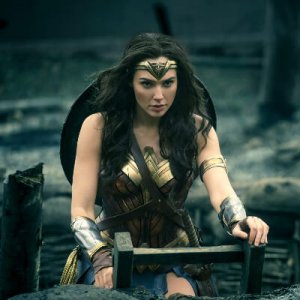 After seeing the movie, there’s no doubt about it: Gal Gadot is the best decision DC has made to this point. Gadot is a force as Diana, squeezing as much emotion and genuflection out of every moment of screen time as she possibly can. Part of this is thanks to director Patty Jenkins, but Gadot’s performance can’t be understated. One of the film’s major problems is the way it writes Diana’s character. There’s a desire to make her seem powerful, yet naive. It’s frustrating, and makes our heroine seem annoyingly arrogant at times. But somehow Gadot minimizes those bad instincts and turns them into dynamic character markers.
After seeing the movie, there’s no doubt about it: Gal Gadot is the best decision DC has made to this point. Gadot is a force as Diana, squeezing as much emotion and genuflection out of every moment of screen time as she possibly can. Part of this is thanks to director Patty Jenkins, but Gadot’s performance can’t be understated. One of the film’s major problems is the way it writes Diana’s character. There’s a desire to make her seem powerful, yet naive. It’s frustrating, and makes our heroine seem annoyingly arrogant at times. But somehow Gadot minimizes those bad instincts and turns them into dynamic character markers.
Her charisma also covers for underwritten character developments. She and Chris Pine — a career-best supporting performance as Steve Trevor — are undersold as an item by the writers. And a climactic moment for their relationship doesn’t feel earned… that is, until Gadot’s emotional response wipes away all reservations.
It feels trite to say, but Wonder Woman couldn’t have been a better moniker for her. With a script that often works against her, Gadot turns in one of the better superhero performances of the last few years. Yes, that’s including all the Marvel and Sony movies that have been released. It’s an oversimplification, but Gadot might have been the savior DC needed after a few critical duds.
But What About ‘Girl’ Power?
One of the biggest promises of Wonder Woman was the long awaited presence of female empowerment in the superhero genre. Black Widow and Scarlet Witch have been sadly cast aside in the Marvel universe. And Jennifer Lawrence’s Mystique feels like an afterthought in the X-Men franchise. So how would DC fare in its attempt to diversify its cast? In the end, it’s a hit and miss attempt.
One of the major hits is the Amazons themselves. Themyscira is presented as an oasis of sorts, a haven from the warring outside world. But instead of making it a paradise, the Amazons live a dynamic, rich life. There’s history, mythology, art, and war. Sisters fight. A political system is in place. Audiences spend a short amount of time there, but it feels like a fully fleshed out world, one I would love to see more of in upcoming Wonder Woman films. Robin Wright is a marvel as Antiope, and Connie Nielsen dazzles as Hippolyta.
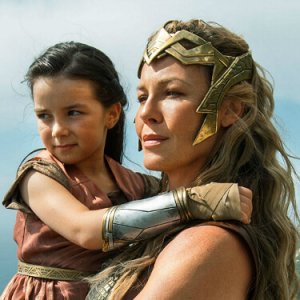 And yet, the Amazons also contribute to one of the more disappointing angles of Wonder Woman’s feminism: the fact that all powerful women are basically supermodels. Themyscira is an island full of beautiful women, a fact not lost on many male characters in the film. But what about the other women in the film? There are really only two of note: Dr. Poison and Etta Candy, Steve’s secretary. Elena Anaya gives a valiant effort as Dr. Poison, but is sadly masked by a lack of confident writing and the seeming desire to manifest her moral ugliness as physical ugliness. She’s portrayed as an example of all that is wrong with humanity, and her disfigured face shows it to the world. Etta Candy, a charming turn from Lucy Davis, is also written as a bumbling, naive woman who clearly can’t see that her “job” is more like slavery. Poor her. If only she were a tall, slender, enlightened Amazon.
And yet, the Amazons also contribute to one of the more disappointing angles of Wonder Woman’s feminism: the fact that all powerful women are basically supermodels. Themyscira is an island full of beautiful women, a fact not lost on many male characters in the film. But what about the other women in the film? There are really only two of note: Dr. Poison and Etta Candy, Steve’s secretary. Elena Anaya gives a valiant effort as Dr. Poison, but is sadly masked by a lack of confident writing and the seeming desire to manifest her moral ugliness as physical ugliness. She’s portrayed as an example of all that is wrong with humanity, and her disfigured face shows it to the world. Etta Candy, a charming turn from Lucy Davis, is also written as a bumbling, naive woman who clearly can’t see that her “job” is more like slavery. Poor her. If only she were a tall, slender, enlightened Amazon.
It’s disappointing to see this double standard. Feminist dialogue is everywhere in the film, but the portrayal of traditionally beautiful women as more empowered and enlightened really undercuts the message.
Love and Total Depravity in the DC Universe
When it comes to the film’s moral center, the writers keep it simple by examining the heart of man: are we corrupted beyond repair, or is there a sliver of goodness in us worth saving? It’s the question Diana must confront by the end, and it’s one that is answered in two different ways.
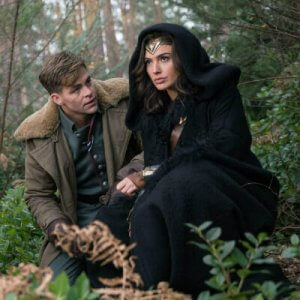 One character offers a simple and noble answer to the question at hand: as humans, we don’t know why we are the way that we are. But ultimately when we know what’s right, we act. The question itself can get in the way of action. It’s an admirable sentiment, and one that takes a step in the right direction, even if it comes up short of gospel truth. Another answer Wonder Woman offers for the corruption in us? Love, the only thing that can save us. Again, it’s somewhat correct. But the film shoehorns “love” into the equation without really examining what kind of love is the answer. Is it romantic, spontaneous love? Is it love of family and friends? Or is there a greater love worth exploring? It’s a heavy question to answer, and one the film doesn’t leave much time to explore.
One character offers a simple and noble answer to the question at hand: as humans, we don’t know why we are the way that we are. But ultimately when we know what’s right, we act. The question itself can get in the way of action. It’s an admirable sentiment, and one that takes a step in the right direction, even if it comes up short of gospel truth. Another answer Wonder Woman offers for the corruption in us? Love, the only thing that can save us. Again, it’s somewhat correct. But the film shoehorns “love” into the equation without really examining what kind of love is the answer. Is it romantic, spontaneous love? Is it love of family and friends? Or is there a greater love worth exploring? It’s a heavy question to answer, and one the film doesn’t leave much time to explore.
So in the end we’re left with two partially correct answers to the question of corruption and depravity. Of course, I never expected the film to present the gospel as the answer to this question. And even asking the question itself is a recognition of humanity’s sinfulness. I just wish more time would’ve been spent actually pondering and less time trying to throw answers at the wall, hoping one would stick with each viewer.
Stepping Forward
A friend of mine — one who has drastically impacted the way I view feminism — posted on Facebook after seeing Wonder Woman a few days ago. She said, in effect, the movie wasn’t perfect, but it was well overdue and a step in the right direction. I can’t help but agree with her entirely. Wonder Woman is a frustrating movie, partially because of the excellent things it brings to the table. It’s well-acted, well-directed, and technically marvelous. The color palettes and cinematography feel right at home as a World War II film, and wholly unique as a superhero flick.
Wonder Woman is also a film full of missed opportunities. It can be reductive in its feminism and partially short-sighted in its morality. The writing isn’t great, and overall it tends to rest on its main selling point — finally! A female superhero movie! — too much instead of giving viewers a fully realized film. The performances are all good, but some side characters feel like reduced caricatures instead of real people.
But in the end, isn’t that what most films do, with men at the center and women left to mingle in the margins? Wonder Woman falls into a lot of the same traps that other superhero films do, except it takes a simple, meaningful step forward by flipping the script. With Gal Gadot on the frontlines, Wonder Woman feels bigger than its missteps. And with a hit on its hands, I’m hopeful DC works to get better with each passing entry. Even this Marvel fan can’t wait to see more of Wonder Woman at the box office.

